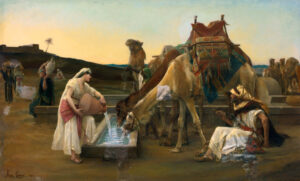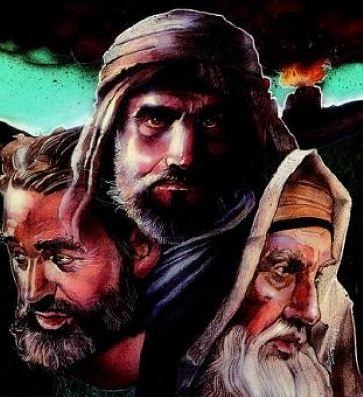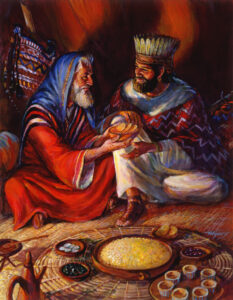
Isaac Carries Forward the Family Name
Although today’s western culture puts the burden on the young adult child to discover![]() the one they are to marry, there is still a major role for wise, godly parents to be a part of the process. The child will still often be an older teen living at home, and as they are testing the waters of relationships, they should be using the parents as a sounding board for all the ups and downs that occur in the process. These godly parents will seek to instill godly values in the child that impact how to be prepared to be a good husband or wife, how to develop habits and behaviors that make you to be a person of competence and compatibility.
the one they are to marry, there is still a major role for wise, godly parents to be a part of the process. The child will still often be an older teen living at home, and as they are testing the waters of relationships, they should be using the parents as a sounding board for all the ups and downs that occur in the process. These godly parents will seek to instill godly values in the child that impact how to be prepared to be a good husband or wife, how to develop habits and behaviors that make you to be a person of competence and compatibility.
However, we all know the trials and tribulations of going through the “rituals” and watching the fleeting emotions of attraction come and go. Even as parents, we share in the struggle, seeking to counsel our children as they seek to develop an understanding of how to translate the emotional roller coaster of dating and discern solid life patterns that matter in a relationship. Was it different for people in other eras of civilization? Sure, just as it is different today in different cultures and people groups of the world. Yet there are also the shared experiences of loving our children, wanting to assure their success and happiness in life, and wanting to guide them towards living a life that carries on our shared beliefs and faith in God in their own families.
It was certainly different in the era of 2000BC, when the father bore responsibility for search for and delivering to his son a worthy bride. I suppose some would say we’ve come a long way over the next four millennia, but there is something to be said for the foundational and strategic priority the father held in those early days. We could do with a lot more of that in our modern society. Click here for a good article from gotquestions.org about the “Godly Father”.
Please pause here and open your Bible and read through Genesis 24-26 in one sitting before you continue on through this Bible Study.

Genesis 24, Finding a Godly Wife
Genesis 24 is a significant chapter because it is the longest chapter in Genesis, and also because it is the only chapter dedicated to Isaac’s life. It is also notable in that it focuses on God providing Isaac his wife Rebekah, a special well-known account from the Bible. This chapter is a great demonstration of a godly father looking to provide properly for his son. At the end of his life, Abraham was concerned that Isaac be provided a wife to carry on the Seed promised by God in the Abrahamic Covenant – the Seed which will be ultimately fulfilled in Jesus Christ (Gal. 3:16). Abraham knew it was important that Isaac not marry a woman from the local idolatrous Canaanite tribes where they currently lived. Isaac

had to have a directly related to the family Abraham originally came from “back east” (note that his son Jacob would also go back east for his wife Rachel, Gen. 28:1-5). Eliezer, Abraham’s faithful servant for many years, is sent back to the “homeland” (Ur) to the city of Nahor (named after Abraham’s brother) in Mesopotamia, a 500 mile trip which would take about a month each way. Abraham knew Ur would be a dangerous place for Isaac to be, so the plan became one for Eliezer to bring God’s chosen woman back to Canaan to be Isaac’s wife. Eliezer made a solemn oath with Abraham, and had a solid faith in Abraham’s God. Some important highlights in this great chapter:
- Gen. 24:12-14, the first prayer in the Bible by Eliezer – expresses faith, selflessness, patience, worship, ready testimony of what God does.
- Gen. 24:33-34 – Eliezer was anxious to tell his story – what amazing news this must have been to Abraham’s relatives – vv34-49
- Gen. 24:45, “I looked up and there was Rebekah!”
- Gen. 24:61, Rebekah’s willingness to return to Canaan and become Isaac’s wife demonstrated her faith in Abraham’s God.
Genesis 25-26, Isaac the Seed Bearer
The God of Abraham, Isaac and Jacob

Isaac, Abraham’s son, inherits and carries forward the Seed, God’s Promises of the Abrahamic Covenant fully and finally manifested in the Messiah, Jesus Christ. As we’ve noted in the Gospel geneologies, the Line of the Messiah is continued through Isaac. Gen. 26:24, God says to Isaac that He is the “God of your father Abraham.” This is first instance of the Bible purposely referring back to the to the initial covenant event with Abraham (Gen. 15), a strong identity reference to Jehovah God, the only One True God, Who will deliver fulfillment of the promises made in that covenant. The Bible refers to God in similar ways several times (see Exo. 3:6 and Acts 7:32 for other examples). This is an emphatic reminder of Who He is and what He is doing for His people. Essentially this is a reference to the entire Hebrew faith – as God established the roots of the Jewish people through these three men. After Jacob, the Jews go into 400 years of slavery in Egypt, after which God “redeems”, rescues them (see Exo. 3:15) and gives them freedom from their bondage in Canaan, the land God had originally promised to Abraham, where Jewish faith matured for the next 1400 years. Through these generations, a deep faith in their God and His promises to His people focused on fulfillment of God’s promised Messiah, Who would come to finally truly and completely redeem the Jews from bondage. The fulfillment of that promise came in Jesus Christ Who established His claim to be the same One True God (Matt. 22:31-32) and the complete fulfillment of God’s promised Redemption (Heb. 2:14-15).
Another Generation
Gen. 25:19 repeats the Hebrew term “toledoth”, which appears to be a grammatical clue to the progressive organization of the Genesis story. So, now we come to the generations or geneology of Isaac.
-
- Gen. 25:7, Abraham’s death
- Isaac’s death not reported until Gen. 35:29
- Most of the narrative becomes the “misadventures” of Jacob & Esau
In Gen. 26:3-5 (and vv23-24), God confirmed the covenant promises to Isaac as He had originally spoken them to Abraham. God stressed the same three elements as He had with Abraham: Land, Seed, and Blessing. Recall that God made this promise as an “unconditional” promise to Abraham – that is, the promise is only backed up by God Himself, the promise can only be broken by Him. The Bible tells us God never breaks His promises — Isaiah 55:11 claims this truth about God as he declares his confidence in God’s word always being true. He never changes, He is always faithful and true.
Similarities between Abraham & Isaac:
-
- God appears to Isaac as He had with Abraham
- Famine sends Isaac back down to Gerar & Abimelech
- But Isaac obeyed God by not going on down to Egypt
- But Isaac repeats Abraham’s error of lying about his wife Rebekah
- Isaac finally moves to Beersheba, where Abraham had gone with Isaac after sacrifice (Gen. 22:19)
Gen. 26:23-25 is a key passage for Isaac and all of Genesis – it is the second appearance of God, and in this passage Isaac finally has “enough room” for people to live peacefully (Rehoboth) so he builds an altar and God reiterates covenant
We’ve Been Here Before
It can be surprising, considering the bad review of Abraham’s encounter with Abimelech (Gen. 20), that we see in Gen. 26 that Isaac follows his father’s path to go back down to Abimelech one more time because of famine in Canaan. The phrase “like father, like son” comes to mind – compare Gen. 12:10-14; 20:1-4. It is actually possible that this was what God’s plan was for Isaac (Rom. 8:28), considering His command in Gen 26:2-3 that Isaac stay in Gerar and not to go down to Egypt. Note that “Abimelech” is a “title” name, this is another Philistine king and not the same man Abraham encountered.
 In Gen. 26:6-7, Isaac obeys and doesn’t go down to Egypt, but then he lies about Rebekah. Sad to see faith and deceit in juxtaposition, but God works in spite of man’s shortsightedness. We are all given to favoring a human strategy for survival, and too quick to forget God’s guidance. God told him to go, so why did he think he needed to manipulate circumstances?
In Gen. 26:6-7, Isaac obeys and doesn’t go down to Egypt, but then he lies about Rebekah. Sad to see faith and deceit in juxtaposition, but God works in spite of man’s shortsightedness. We are all given to favoring a human strategy for survival, and too quick to forget God’s guidance. God told him to go, so why did he think he needed to manipulate circumstances?
Gen. 26:15-22, Isaac and Abimelech’s peoples began to argue over wells. Wells made a civilization possible, so they were as critical as they were valuable. Isaac’s clan was becoming powerful and the Philistines were wary of an attack, even though Isaac had no such intention. Isaac managed this confrontation wisely, he started with re-opening a well orginally dug by his father Abraham, then later claimed by the Philistines; he then moves further away (back towards Beersheba where he should be going anyway) and digs a new well, and the Philistines claim that water was theirs too! Note that the Philistines later became fierce enemies of Israel.
Gen. 26:26-31, A “State Visit” takes place in order for Abimelech and his allies to attempt to establish good relations with Abraham’s clan. God is satisfied, He has endorsed and confirmed His blessing on Isaac and his people.
![]() Bible Study Journal
Bible Study Journal
- How did Isaac’s experience with Abimelech differ from Abraham?
-
- What was the significance of the well reported by Isaac’s servants in Gen. 26:32-33? What did they name it and why?
- In Gen. 24:50-58 and 29:15-30, how do Eliezer and Jacob differ in dealing with Laban?
- What do we learn about Esau’s character in Gen. 26:34? How does show up in Gen. 27:41?
- What do we learn about Rebekah’s character in Gen. 26:5-17? How does that relate to her brother Laban?
- Gen. 26:27-29 and 39-40, Compare the good and features of Abraham’s blessings to Jacob and Esau.
-

st



